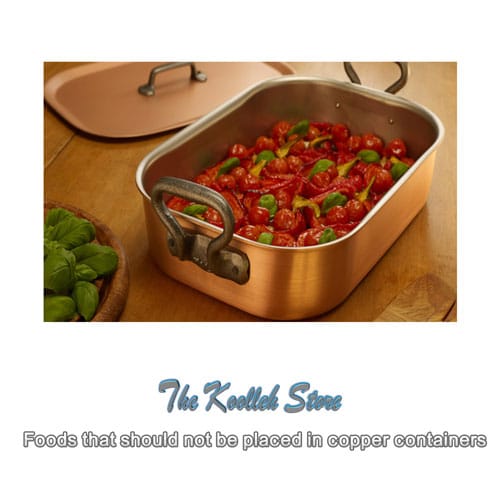Foods that should not be placed in copper containers

It is not recommended to store meat, tomatoes, plums, beets and boiling vinegar, broth and orange juice in a copper container. Copper will help build blood vessels and blood vessels in the heart, and 5.1 milligrams a day should be taken with food. If the copper intake is higher than the recommended values or secondary compounds are exposed to heat in acidic environments and play in reaction with copper, it may cause acute or chronic poisoning.
In the past, copper pots on a larger scale in the form of pots, pots and spoons, forks and Copper plates were used to serve food, to prevent direct contact with acidic foods and Playing with it and causing poisoning and diseases caused by the entry of copper ions and other compounds into the food environment was being prepared, the copper container was coated with tin and nickel, and if the protective layer was removed, the copper container would be scratched and the copper metal directly. Under the influence of acidic properties or the play of food being cooked or served, copper or its secondary compounds entered the food in significant amounts, leading to consumer poisoning.
Of course, if the copper container is completely covered with a protective layer and no scratches and abrasions have been created in this layer, they are used due to the ability to guide and facilitate complete heat transfer and the possibility of controlling the temperature, but despite all the advantages, recommendations and It is important to avoid storing some foods that are acidic or playful in a copper container; For example, it is not recommended to store and cook meat, tomatoes, plums, beets and boiling vinegar, juice and orange juice in a damaged copper container.
Despite the arrival of new compounds in the food industry and cooking utensils, there is a great variety and change in the utensils used. It is used as a precaution, and every year the protective layer is renewed by coating them with tin and nickel.
Because the metals are more expensive and time consuming, some blenders sometimes pose new and more serious risks to people by saving or speeding up the bleaching process by mixing lead with the metals. they do.






